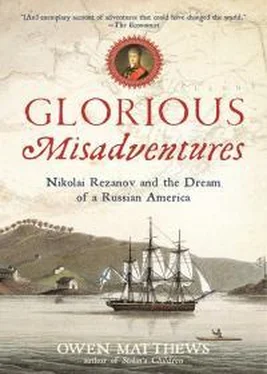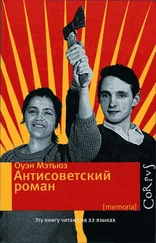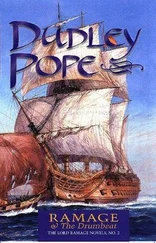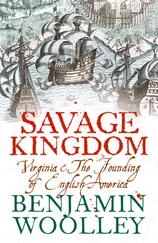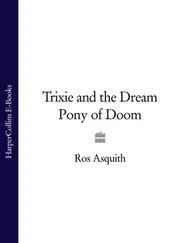Sadly for Alexandra – and one suspects to the disapproval of both his father and father-in-law – Pyotr Rezanov’s military career proved a disappointment. A few years too young to profit from the frenzy of promotion, plunder and glory of the Seven Years’ War, Pyotr soon came to see that the outbreak of peace between Russia and Prussia made a career in the army a dead end – at least until the start of the next war. He was, however, freer than his ancestors to choose a career path outside the army. Tsar Peter III, architect of the alliance with Prussia that caused the untimely (for Rezanov at least) cessation of hostilities, reigned for just 186 days before being deposed by his energetic German wife Catherine in July 1762. But one of the few laws to survive from his mayfly reign was the liberation of the nobility from compulsory state service imposed by his illustrious grandfather and namesake, Peter the Great. Unfortunately, Peter III neglected to lift the other half of the original law on nobility, which barred members of the aristocracy from engaging in commerce. This meant that aristocrats now indeed had a career choice of sorts, but it was a narrow one between state service or idleness.
For noblemen of modest means like Pyotr Rezanov, however, unemployment was not an option. Within civilian state service there were three pathways. The more ambitious and well connected of the nobility could attempt a career at the imperial court, the fickle fons et origo of all power, wealth and favour. For the less socially elevated, there was the civil government, consisting of the governing Senate, which supervised the bureaucracy, and ten ministries. This was the option energetically pursued by Pyotr’s younger brother Ivan, who had joined the College – Peter’s term for his embryo ministries – of Foreign Affairs and by the 1770s had risen to deputy head of its chancellery. But there was a third option: a career in Russia’s wild and distant colonies. This was risky, dangerous and not wholly respectable, but could lead to great wealth. Like many young and indigent noblemen across Europe, Pyotr Rezanov chose to leave his birthplace and seek his fortune in distant lands. For a young Russian aristocrat this meant the vast half-tamed land of Siberia.
Footnotes
* From the Empress Anna’s infant nephew Ivan VI, who was kept a secret state prisoner until his death in captivity twenty years later.
* It was to be the first of three Russian invasions of Germany: ‘Iwan’ would be back in Berlin in 1814 and, in rather greater numbers, in 1945.
2
The Final Frontier
In Europe we are hangers-on and slaves, but in Asia we are masters. In Europe we were Tatars, but in Asia we too are Europeans.
Fyodor Dostoevsky, 18811
The boiling ferment and the frantic, aimless activity which distinguishes young nations.
Alexander Pushkin
Spain and Russia were medieval Europe’s marcher kingdoms. Spain held the North African Moors at bay in the west, while in the east Russia battled the Mongols and their successors, the Muslim Tatars.2 Both Spain and Russia, as a result of the demands of centuries of military effort, remained more autocratic, more religious and more deeply feudal than their less-threatened continental neighbours. But both Madrid and Muscovy were richly rewarded for their struggles against the infidel in the form of vast unexplored lands full of worldly riches. Divine providence gave Spain the New World – or so Spain’s Most Catholic monarchs believed. Likewise Russia’s most Orthodox Tsars were convinced that their divine reward was Siberia, whose boundless natural resources funded the emergence of Muscovy as a European power, and forms the foundation of Russia’s oil wealth today.
The grand princes of Muscovy had had dreams of empire since 1472, when Ivan III married Zoë Paleologina, the niece of the last Byzantine emperor, Constantine XII. Zoë brought not only her double-headed eagle coat of arms to Muscovy but also the idea that Moscow could be the successor to her fallen Byzantine homeland – a third Rome. Russia’s expansion to the west was blocked by the powerful kingdom of Poland-Lithuania and the Baltic trading cities of the Hanseatic League. But to the east the power of the Mongol-Tatars was weakening.
It was Zoë’s grandson Ivan the Terrible who decisively turned the balance of power on Christendom’s eastern flank when he took the Tatar capital of Kazan in 1553. Ivan crowned himself caesar – in Russian, tsar – in recognition of his conquest. In 1556 he pushed his armies south along the Volga and annihilated the southern Tatars in their stronghold at Astrakhan. At a stroke Ivan had made the Volga, the great southern artery of European Russia, into a Muscovite river, opening trade to the Caspian and beyond to Persia.
The capture of Kazan had also given Muscovy easy access to the Kama River, the Urals and the riches of Siberia itself. At the same time Europeans in search of furs and a north-east passage to China began arriving at the Arctic village of Kholmogory – later known as Arkhangelsk – at the mouth of the Northern Dvina River. The first was Richard Chancellor, head of the English Muscovy Company, London’s first chartered company of merchant adventurers, who visited in 1553.
Meanwhile Spain’s conquests in distant America were transforming the economy of Europe with a huge influx of gold. Northern Europe was also undergoing a boom in trade and manufacture centered on wool-cloth. With this new prosperity came a burgeoning demand for luxury goods from the East, particularly for the sixteenth century’s two greatest luxuries – spices and furs. Portuguese and English seafarers were driven to prodigies of navigation and discovery by the search for high-value spices – particularly peppercorns, nutmeg and allspice – to flavour the foods of the wealthy. In the same way Russian adventurers drove ever deeper into Siberia in search of the fox, sable and marten with which the rising merchant classes of Europe trimmed their clothes.
Fur, in a cold and poorly heated world, was not only a symbol of wealth but also a bringer of comfort and, in the case of Russia, literally a lifesaver. Fine furs were staggeringly valuable. In 1623 one Siberian official reported the theft of ‘two black fox pelts, one worth 30 rubles the other 80’.3 The thief could have bought himself fifty Siberian acres, a cabin, five good horses, ten cows and twenty sheep on the proceeds, and still have had some of his ill-gotten money left over. No wonder painters of the new bourgeoisie, from Jan van Eyck in the Netherlands to Sebastiano del Piombo in Rome, painted their subjects’ sable collars in such loving detail. They were often worth more than the artist could hope to make in years.
Siberian fur transformed Muscovy from a minor principality on the fringes of Europe into a great power.4 In 1595 Tsar Boris Godunov had so much of it that he sent Holy Roman Emperor Rudolf II fur in lieu of military assistance against the Turks. Boris’s tribute was a dazzling show of Russia’s new wealth. The 337,235 squirrel skins and 40,360 sables, as well as marten, beaver and wolf skins Boris sent took up twenty rooms of Prague Castle. At the beginning of the seventeenth century ‘soft gold’ accounted for up to a third of Muscovy’s revenues. Without the Siberian fur rush, the wealth it brought and the vertiginous territorial expansion that it drove, the Russia of Peter the Great would have been unimaginable.
Like the Spanish captains of the New World or the seafarers of Queen Elizabeth I of England, the conquistadors of Siberia were essentially pirates licensed by the Russian crown. The Stroganovs, a trading dynasty from the Hanseatic city-state of Novgorod, which had been incorporated into Muscovy in 1478, financed the first fur-trapping expeditions into the uplands of the Urals and pioneered the use of licensed privateers. In April 1558 Ivan the Terrible gave Anikei Stroganov rights over five million acres of Urals forest, effectively making him viceroy of the unexplored territory responsible for its development and security.5 Beyond the Urals, however, lay the Tatar khanate of Sibir, an obstacle both to obtaining furs and to the expansion of the Tsar’s dominion.
Читать дальше
